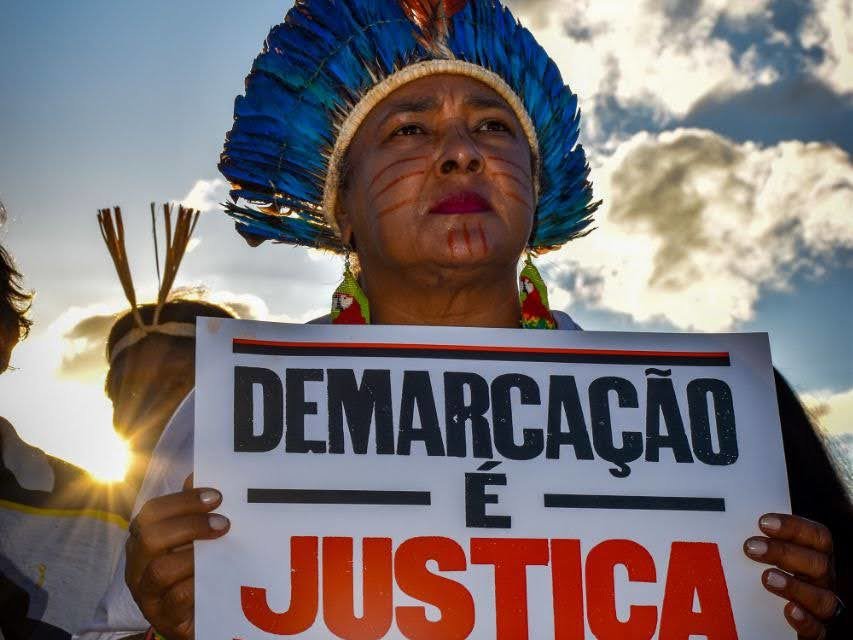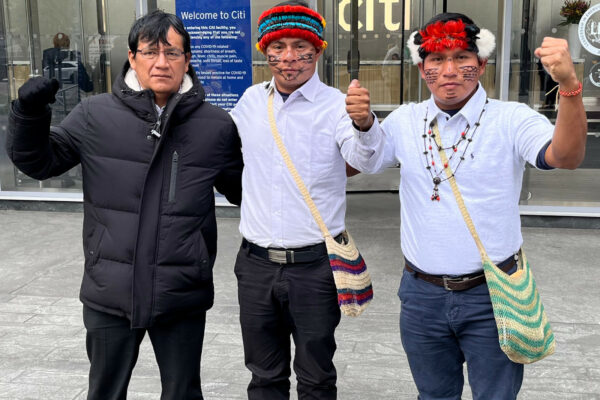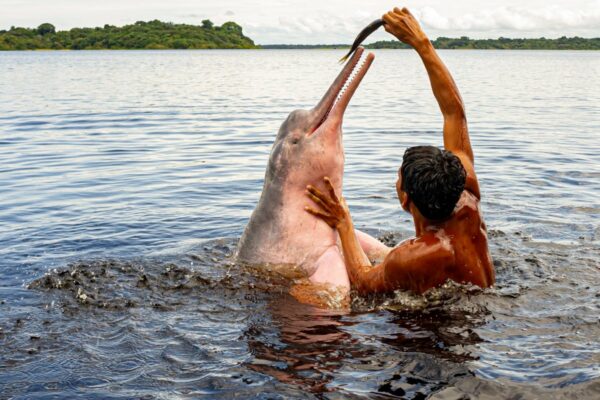Oakland, CA – After two weeks of campaigns led by the Indigenous movement with the participation of environmental and Indigenous rights organizations, Brazil’s President Luiz Inácio Lula da Silva (“Lula”) finally issued his official position and vetoed key parts of Bill 2903, which would have dramatically limited the ability of Indigenous peoples to gain formal recognition of their ancestral territories. This bill is part of a right-wing backlash against the increasing power of Indigenous peoples in Brazil and the many important victories that they have achieved to have their lands and rights recognized.
The official announcement of Lula’s partial veto of the bill has just been released, and we can confirm that he vetoed the article which attempted to reimpose the “Marco Temporal” thesis, despite it having been ruled unconstitutional by Brazil’s Supreme Court the same day that the bill was passed in the Congress. He has also vetoed sections allowing mining, road construction, and GMO agriculture on Indigenous lands, among others.
Sonia Guajajara, Minister of Brazil’s Indigenous Peoples, stated:
“It is important to say that Article 4, which refers to the Marco Temporal thesis, was completely vetoed. Lula also vetoed the attempt to abolish the Indigenous right to Free, Prior, and Informed Consultation, the section of the bill that made it easier to intrude upon the territories of isolated Indigenous peoples, as well as the article that would have prohibited the expansion of Indigenous lands that are already demarcated. But the essential thing is that the president’s vetoes guarantee the protection of Indigenous land rights.”
Célia Xakriabá, Member of Brazil’s Chamber of Deputies, said:
“Lula vetoed important parts of PL 2903, such as the one that dealt with the Marco Temporal for Indigenous lands. A victory for our people’s struggle!
“Our fight has always been for the total veto of the bill, which we consider an attack on Indigenous peoples, but nonetheless we consider this an important victory.
“We will continue to mobilize next week to coordinate the preservation of these vetoes, which return to Congress for a vote. We need to carry on with the support of everyone – of the nearly one million people who signed our petition – and stand by the forests!
“No to the Marco Temporal! Demarcation now! Territory is life!”
Amazon Watch Brazil Program Director Paula Vargas, stated:
“This veto is a cause for celebration. Of course, we note it is a partial victory, and the risks to Indigenous rights in Brazil are still immense. President Lula stated his position against centuries of genocidal oppression that forced many peoples to flee their ancestral homes. But by not vetoing the entirety of the bill he favored one side of this war: the destructive, anti-environmental, and anti-Indigenous one, as at the heart of the dispute is the agribusiness and mining sector, aligned against Indigenous peoples rights, and the protection of the Amazon and the environment. Clearly, the battle continues. The future of Brazil’s Indigenous peoples and their territories (the largest biodiversity sites in the world), and of life itself on planet Earth are still at stake after this attack orchestrated by the ruralist and mining caucus in the Congress.
“The articles not vetoed now have the status of law, and could open many opportunities for attacks on Indigenous rights and the environment. The two most concerning articles that remain are Article 20 (which states that the Indigenous right to exclusive usufruct of their lands does not override the interests of national defense or sovereignty policies) and Article 26 (which enables economic extraction in Indigenous lands in partnership with non-Indigenous people and organizations). We still need time to assess the whole impacts, but the consequences for Indigenous peoples, the Amazon, and the climate will certainly be disastrous, as these articles undermine Indigenous sovereignty and autonomy and continue to threaten the rainforest with the possibility of collaboration with mining and agribusiness projects of various scales.
“The battle for Indigenous land rights continues in the legislative branch. The presidential veto will now be analyzed by the National Congress, which will have one month to approve or override its terms. The rejection of Lula’s veto requires the vote of an absolute majority of Federal Deputies and Senators, respectively 257 and 41 votes in the lower and upper houses. If Congress attempts to overturn the veto, the bill can be taken to the Supreme Court for judicial review by political parties, the Public Prosecutor’s Office, Indigenous organizations, or other actors. Indigenous peoples from Brazil together with national and international allies must continue to struggle to defend their rights and our global climate.”
Background:
On September 27, the Brazilian Supreme Court (STF) overruled the “Marco Temporal” thesis, a deceptive legal theory which would invalidate the land claims of all Indigenous groups who did not physically occupy their territories in 1988, and found it to be unconstitutional. But on the same day, in an act of defiance against the Supreme Court’s ruling, the agribusiness-dominated National Congress approved Bill 2903, which not only institutes the Marco Temporal but also attempts to open up Indigenous lands to industrial exploitation, including mining, infrastructure, and energy projects such as dams, highways, ports, and railroads. It would have also made the protection of Indigenous groups in voluntary isolation subordinate to the “national interest,” jeopardized biodiversity, and reestablished the colonial logic of Indigenous assimilation into national society. Other sections of the bill would have fueled legal challenges against all existing Indigenous lands in Brazil.
Following the legislative process, the bill was then sent to President Lula, who had two weeks to approve or veto its content. Civil society mobilized around a campaign demanding that Lula “veto it all,” rejecting the entirety of the bill. On the last day, Lula issued a partial veto, allowing some of the bill to become law but vetoing its most dangerous provisions.
The legislature is set to review his vetoes next week, and it could override them with a majority vote in both houses. In this case, the issues are likely to be finally decided by Brazil’s Supreme Court, which has already ruled that the Marco Temporal thesis is unconstitutional.














